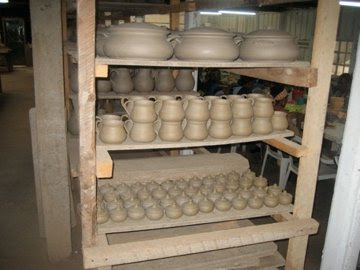
One of the places that we visited with the college students was a bead and pottery factory which employs hundreds of women. It is not a sweatshop; the women are extremely grateful for the work as the company provides health benefits as well as school uniforms for the workers' children. They are all single mothers living in the Karen area near Nairobi and this factory is a place which pays living wages. Some of the women who work here walk miles to work each day; it is worth it to them. Kazuri Beads was started in 1975 as a project to develop employment opportunities for Kenyan women who had limited job skills. At first they imported clay from England and sold products locally. Today they process local clay and sell globally. A huge dry-erase board serves to chart orders indicating how many thousands of beads are needed each day.

When visitors stop by the factory, they are given a brief tour. The first stop is the machinery which mixes and prepares the clay. Bars of freshly pressed clay are stacked up to be taken to the women inside the shop. Next one enters the bead-making portion of the factory. This is a large series of rooms filled with tables where scores of women sit doing specialized tasks. Some are rolling clay into beads according to specific patterns. Others apply glaze in patterns and colors corresponding to the hand-written lists in front of them. Still others string beads into earrings, bracelets, and necklaces to create the final products listed for shipment that day. Between these three stages, the beads are fired (cooked) and cooled, sometimes several times.


The penultimate stop was the pottery production area. Fewer workers are involved in this process and many of the pots are created by men. Firing the pots takes several days and the number of patterns available are necessarily limited.

 Of course, the last stop was the gift shop where one could see thousands of combinations of beads. While it is possible to buy loose beads, the greatest number of sales are of pieces already made up, either individually or in sets. The girls in our group spent many minutes considering and consulting before making their purchases.
Of course, the last stop was the gift shop where one could see thousands of combinations of beads. While it is possible to buy loose beads, the greatest number of sales are of pieces already made up, either individually or in sets. The girls in our group spent many minutes considering and consulting before making their purchases.Most of the women who work at Kazuri Beads were cheerful, at least in our presence. They chatted with one another, but kept busy. Our tour guide encouraged us to keep moving. I suppose that frequent conversations with visitors would hamper production. But the women were always glad to show us what they were doing. They produce some beautiful handwork. Cat is delighted to own some necklaces and bracelets from this community-minded enterprise. You can buy Kazuri beads online, but there is nothing like seeing the shop in person.


1 comment:
I was glad to read about a place that is helping the women. What beautiful work.
Post a Comment